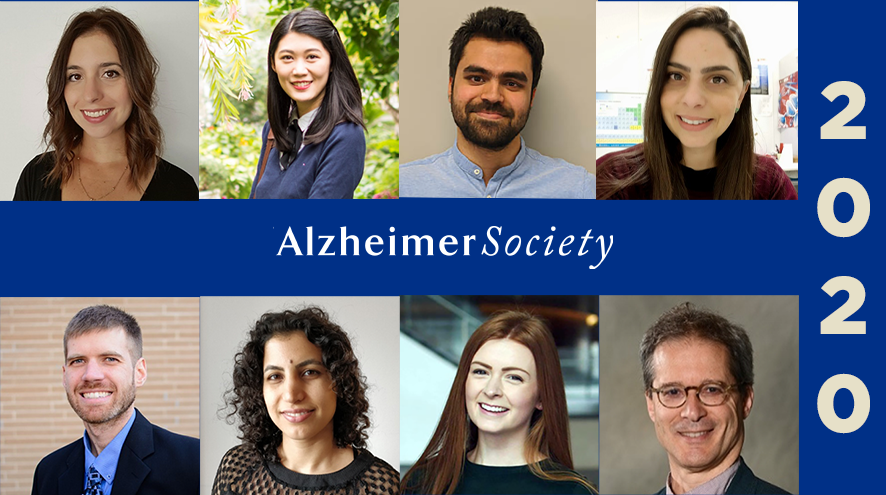2020 funding results
We're pleased to announce the following 2020 grants and awards for the Alzheimer Society Research Program, funding Canadian researchers in the field of Alzheimer's disease and other dementias, in the following areas of research.

Cause

Kaori Takehara-Nishiuchi, University of Toronto
Title: Disrupted hippocampal-neocortical interaction as a cause of memory impairments in Alzheimer’s disease.
Award/Grant: Proof of Concept Grant
Funding amount, priority, and timeline: $100,000, Discovery, 2 years
“My research will contribute to the development of next-generation therapy in restoring normal brain activity patterns that are crucial for sustaining memory.
This new approach will provide additional, and potentially more effective, treatment options for people with dementia than medications that are currently available.”

Samantha Creighton, University of Toronto Mississauga
Title: The histone variant H2A.Z: a novel epigenetic therapeutic target for Alzheimer's disease
Award/Grant: Postdoctoral Award
Funding amount, priority, and timeline: $100,000, Discovery, 2 years
“The histone variant, H2A.Z, is a promising new therapeutic target with the potential to regulate both memory and Alzheimer’s disease-related brain pathology.
By investigating the role of H2A.Z in Alzheimer’s disease, I hope that my research will lead to the development of better therapies for persons living with dementia.”

Elyn Rowe, University of British Columbia
Title: Peripheral ApoE: Overlooked in the context of Alzheimer disease?
Award/Grant: Doctoral Award
Funding amount, priority, and timeline: $66,000, Discovery, 3 years
“While realistically my research is lab-based and may be years away from entering the clinic, it will further the understanding of the most prominent genetic risk factor for Alzheimer disease from a new perspective.
Aside from my research in the lab, I hope to also help bridge the gap between the jargon-filled scientific community, and the wider community of those affected by the disease. This will entail making Alzheimer’s research more accessible by getting involved with science journalism initiatives, and providing accessible translations or video abstracts of any scientific papers that I publish.”
Therapy

Erica Dove, University of Toronto
Title: Exergame Design for Improving Balance and Redcuing Falls among People with Cognitive Impairment.
Award/Grant: Doctoral Award
Funding amount, priority, and timeline: $66,000, Discovery, 3 years
“The active video game we develop could impact balance and fear of falling among the people with dementia who take part in the research.
This may then confirm the practicality and potential benefits of using active video games to deliver exercise to people with dementia.”

Chetan Patil, University of Manitoba
Title: Pannexin channels: therapeutic target for early synaptic injury in Alzheimer's disease.
Award/Grant: Doctoral Award
Funding amount, priority, and timeline: $66,000, Discovery, 3 years
“I believe my research will establish the contribution of Pannexin (a protein in humans that is encoded by the gene Panx1) to neurodegeneration in Alzheimer's disease. We will use a novel peptide to prevent augmented Pannexin. This is a unique approach to disrupting pathological mechanisms initiated by Aβ (amyloid beta).
Our hope is that this strategy will lead to the development of novel therapeutics that are able to mitigate neuron death and thereby delay or prevent the progression of Alzheimer's disease. Our collective aim moving forward is to have a positive impact on people living with dementia and to improve Alzheimer's disease prognosis.”

Jonathan Epp, University of Calgary
Title: Altered functional connectivity modulates cognitive decline in Alzheimer’s disease.
Award/Grant: New Investigator Grant
Funding amount, priority, and timeline: $200,000, Discovery, 2 years
“The main goal of my research is to understand the changes that occur in the brain in response to brain training or cognitive exercise. If we can gain a better understanding of how these changes promote cognitive function, then we may be able to optimize these types of interventions or apply them in different ways, such as targeted neurostimulation.
It is my goal to be able to eventually apply our research to help preserve cognitive function, and therefore improve the quality of life of individuals with dementia and their caregivers.”
Improving care for people with lived experience

Elaine Moody, Dalhousie University
Title: Understanding the context of nursing care for people with dementia in hospital: Enabling adoption of interventions to improve care.
Award/Grant: New Investigator Grant
Funding amount, priority, and timeline: $98,946, Policy & Health Systems Change, 2 years
“One of the goals of the project is to develop feasible and realistic strategies to support the adoption of innovation to improve care of people with dementia in the hospital. This goal is intended to support the integration of the research findings with health system policy to affect change.
With the anticipated increase of people with dementia in hospital, we hope to contribute to a foundation of knowledge that can enable a transition to care that is focused on the needs of people with dementia and their caregivers.”

Aaron Jones, Sunnybrook Research Institute
Title: Moderating effects of Alzheimer’s disease and related dementias on the influence of risk factors and health services on transitions in care: A longitudinal cohort study of care trajectories of home care patients using multistate transition models.
Award/Grant: Postdoctoral Award
Funding amount, priority, and timeline: $100,000, Evaluation of Community Programs, 2 years
“Funding for the Alzheimer Society Research Program helps to provide the evidence needed to transform home and community to better support the growing number of people with dementia and their caregivers.
I believe that that my research will improve the support that home and community care can offer to people with dementia and their caregivers. Our aim is to enhance their quality of life while aging in the community.”

Matthias Hoben, University of Alberta
Title: Routine quality of life measurement in moderate to severe dementia.
Award/Grant: New Investigator Grant
Funding amount, priority, and timeline: $199,982, Policy & Health Systems Change, 2 years
“It is critical to understand how quality of life (QoL) is understood within care settings. Our research will create the conditions required to measure, further study, and ultimately, improve and maximize QoL in people with dementia.
We will first focus on Assisted Living settings in Alberta because it is the only Canadian province/territory to have made routine, system-wide measurement of QoL a policy priority. We will then be able to extend our research within future studies to Long Term Care settings and within other Canadian provinces and territories.”

Kishore Rajaram Seetharaman, Simon Fraser University
Title: Improving Outdoor Navigation of Persons with Dementia through Supportive Environmental Design: A Participatory Action Research approach.
Award/Grant: Doctoral Award
Funding amount, priority, and timeline: $66,000, Policy & Health Systems Change, 3 years
“Mobility is a key aspect of aging well with dementia in the community. Supporting the wishes of older Canadians living with dementia to age well in their current space, entails creating supportive and inclusive outdoor places that enhance their mobility and participation in the community.
My research will highlight the role that the outdoor environment, more specifically the built environment, can play in helping people living with dementia to enhancing their quality of life, by being out and about.”
Risk and prevention

Mahsa Dadar, Laval University
Title: AI-driven detection of small vessel disease and assessment of its effect on cognitive decline in the context of neurodegeneration.
Award/Grant: New Investigator Grant
Funding amount, priority, and timeline: $100,000, Discovery, 2 years
“The results of this project will have immediate application for strategies to slow down cognitive decline.
Since many risk factors that are associated with cerebrovascular disease and its progression are potentially modifiable through treatment (e.g. antihypertensive medications) and lifestyle changes (e.g. physical activity, obesity, smoking), showing the effect of cerebrovascular disease on cognitive decline provides an avenue for preventing future instances of degeneration.”
Epidemiology

Paul Brassard, McGill University
Title: The infection hypothesis in the etiology of Alzheimer’s disease: Infectious diseases burden and risk of dementia.
Award/Grant: Proof of Concept Grant
Funding amount, priority, and timeline: $99,948, Discovery, 2 years
“Currently, the literature around the association between clinically apparent infections and risks of dementia lacks high-quality evidence. Many studies are limited because of their inadequate scientific rigor and their tendency to generate conflicting findings.
We hope the findings from this study can provide insight on the role of infections in dementia in order to inform the development of prevention strategies, such as vaccination programs.”

Isabelle Dufour, McGill University
Title: Care trajectories of seniors with major neurocognitive disorders in Quebec.
Award/Grant: Postdoctoral Award
Funding amount, priority, and timeline: $100,000, Evaluation of Community Programs, 2 years
“This project will offer a first analysis of care trajectories, that is, the route through the health system of Quebec for seniors living with dementia.
An optimal understanding of the care trajectories of seniors living with dementia will provide a better understanding of the 'missed opportunities' to improve the health care available to them.”
*This project is being sponsored by Uniprix.*

Zahra Shirzadi, Harvard Medical School
Title: Vascular contributions to cognitive decline and dementia: the interplay of vascular markers and proteinopathies in Alzheimer’s disease.
Award/Grant: Postdoctoral Award
Funding amount, priority, and timeline: $100,000, Discovery, 2 years
“More than half a million Canadians live with dementia which costs the nation over 10 billion dollars per year. This research is in line with the government of Canada’s National Dementia Strategy plan that is focused on preventing dementia and seeking better treatments. This project will also build upon the current nationwide initiatives, e.g. Canadian Consortium on neurodegeneration in Aging, to understand the Alzheimer's disease trajectory.
As a scientist, my goal is to elucidate critical mechanisms and identifying biomarkers of Alzheimer's disease. I hope my research will contribute to the development of innovative prevention and treatment strategies for dementia within our lifetime.”
Translational

Charlene Chu, University of Toronto
Title: Assessing the physiological, functional, and behavourial effects of oral cannabidiol oil in older adults with dementia living at home using in-home sensors: a pilot study.
Award/Grant: New Investigator Grant
Funding amount, priority, and timeline: $199,955, Ethical & Legal Issues, 3 years
“My research is focused on real-world solutions that are translatable into the home or into clinical settings. I will incorporate the preferences of people living with dementia, their caregivers and healthcare providers in order to develop solutions that can best respond to their needs.
I want to improve the lives of people with dementia and enhance their mobility, function and quality of life, while supporting their caregivers and healthcare providers.”
Developing treatments

David Gosselin, Laval University
Title: Understanding and rejuvenating microglial phagocytosis as mean to inhibit progression of tauopathies in a mouse model of Alzheimer’s disease.
Award/Grant: New Investigator Grant
Funding amount, priority, and timeline: $200,000, Discovery, 4 years
“There is no doubt that knowing what is defective in a given disorder is of tremendous help for the design of new drugs that can correct this defect.
In essence, finding this defect in Alzheimer's disease is where I believe I can make a substantial contribution towards in the field of dementia research. This in turn will provide essential knowledge that can be used to better treat related disorders.”

Scheila Schmidt, University of Western Ontario
Title: Manipulating astrocyte cholinergic signaling to improve cognition in an Alzheimer’s disease mouse model.
Award/Grant: Postdoctoral Award
Funding amount, priority, and timeline: $100,000, Discovery, 2 years
“Evidence suggests that there is a strong relationship between acetylcholine malfunction (an important messenger that regulates memory), neurodegeneration and cognitive deficits in Alzheimer's disease.
We anticipate that by re-establishing functions of acetylcholine it will be possible to increase neuronal plasticity and combat cognitive deficits present in Alzheimer's disease, including attention and other aspects of executive function. Our work may shed new light on ways to improve cognition in dementia that could be used to create new medicines.”

Matthew Macauley, University of Alberta
Title: Functional and Therapeutic Modulation of Microglia by CD33.
Award/Grant: New Investigator Grant
Funding amount, priority, and timeline: $200,000, Discovery, 3 years
“Immunotherapy to treat dementia could be a transformative treatment strategy, as highlighted by the huge success of targeting immune cells in cancer therapies.
Ultimately, if we can promote the immune cells in the brain to protect against the pathological hallmarks of dementia, it would be a major step forward in impacting the lives of Canadians living with dementia.”
Diagnosis and detection

Mirza Faisal Beg, Simon Fraser University
Title: Genetic Correlates of AD Subtypes.
Award/Grant: Proof of Concept Grant
Funding amount, priority, and timeline: $100,000, Discovery, 2 years
“Our research will generate tools that make precise measurements of the brain, which will help doctors better diagnose, treat and manage people with dementia.
We hope our research will design tools that will help us to better understand brain structure and function. These tools will be useful to every individual living with dementia as they will lead to improved treatments and interventions which will help to slow-down or halt this disease in its tracks.”

Thalia Field, University of British Columbia
Title: CANARY: Clinical dAta, NAtural language pRocessing and eYe tracking for dementia risk stratification
Award/Grant: Proof of Concept Grant
Funding amount, priority, and timeline: $100,000, Discovery, 3 years
“Clinical trials use many methods to identify people for research. These methods are resource intensive, invasive, and require expert interpretation. After going through these processes, roughly 80% who are screened are still unable to participate in a clinical trial.
Moving forward, we aim to make research participation more comfortable for those living with Alzheimer’s disease. We also want to make research more efficient so that we can develop an effective medication as soon as possible.”

Jinghan (Jenny) Chen, Sunnybrook Reseach Institute
Title: Changes in brain glutathione in patients with mild vascular cognitive impairment.
Award/Grant: Doctoral Award
Funding amount, priority, and timeline: $66,000, Discovery, 3 years
“My study aims to identify biomarkers as potential targets for treatment for those at risk of developing dementia.
Dementia has such an overwhelming impact on both patients and caregivers, so finding new therapies is crucial in order to change the course of cognitive decline.”
